Remember when The Big Bang Theory ruined Raiders of the Lost Ark by pointing out the “glaring story problem” that the iconic hero Indiana Jones has absolutely no effect on the outcome of the story? None at all.
At those words, millions of fanboys cried out in terror and were suddenly silenced. And I’m here today to rub another gallon of salt in that wound by sharing 10 more films with heroes who play no role in how they turn out. Let’s get right to it.
1. Watchmen
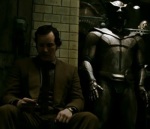 It’s hard to say who is the main character of Watchmen, but I’ll split that honor between Dan Dreiberg and Rorschach since we seem to spend the most time with them. They spend most of the movie trying to unravel a mystery, but their investigations prove fruitless. During their big fight with the main villain in the end, it turns out the villain is just toying with them because he already carried out his scheme long before they arrived to stop him.
It’s hard to say who is the main character of Watchmen, but I’ll split that honor between Dan Dreiberg and Rorschach since we seem to spend the most time with them. They spend most of the movie trying to unravel a mystery, but their investigations prove fruitless. During their big fight with the main villain in the end, it turns out the villain is just toying with them because he already carried out his scheme long before they arrived to stop him.
For better or worse, Dan and Rorschach are completely ineffective and don’t contribute to or hinder the conclusion of the story. Sure, Rorschach’s journal survives and it could lead to the unraveling of the villain’s master plan, but that’s pure speculation and the film ends on a purposely ambiguous note to highlight that point.
2. To Kill a Mockingbird
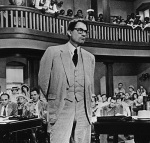 Atticus Finch has been hailed to high heaven as one of the best protagonists ever. And yet if you removed Finch entirely from the story of To Kill a Mockingbird, nothing would change. He didn’t prevent the townspeople from coming to the jail and killing an innocent man; his daughter did. He didn’t save his daughter from certain death; Boo Radley did.
Atticus Finch has been hailed to high heaven as one of the best protagonists ever. And yet if you removed Finch entirely from the story of To Kill a Mockingbird, nothing would change. He didn’t prevent the townspeople from coming to the jail and killing an innocent man; his daughter did. He didn’t save his daughter from certain death; Boo Radley did.
And despite his stirring defense in the courtroom, the jury still convicted Tom Robinson of a crime he didn’t commit, and a group of people killed him later that night. Finch didn’t change anyone’s mind or actually accomplish anything in the whole movie. The only thing he did was kill a rabid dog, which anyone else with a gun could have done.
3. Terminator 3: Rise of the Machines
In the first two Terminator films Sarah Connor is squarely at the center of the story, and she has a big role to play in the outcomes of those films. In the third film, John Connor steps into Sarah’s role, but he doesn’t affect the War of the Machines the way the first two films did. In the end, John’s survival appears almost trivial when compared to the worldwide nuclear destruction taking place.
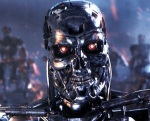 The Terminator may have saved John from dying, but the bigger picture is that neither John nor the Terminator did anything to prevent war from starting. I suppose that John’s birth would have been a paradox if SkyNet didn’t exist, but that doesn’t change the fact that he has no impact on the horrifying conclusion of Terminator 3: Rise of the Machines.
The Terminator may have saved John from dying, but the bigger picture is that neither John nor the Terminator did anything to prevent war from starting. I suppose that John’s birth would have been a paradox if SkyNet didn’t exist, but that doesn’t change the fact that he has no impact on the horrifying conclusion of Terminator 3: Rise of the Machines.
4. Star Trek V: The Final Frontier
 It’s a fitting irony that William Shatner’s love letter to Captain James T. Kirk made that character completely irrelevant to the story. Think about this for a minute: In Star Trek V: The Final Frontier, Sulu pilots the shuttlecraft into the Enterprise, Sybok brainwashes Kirk’s entire crew to do his bidding, Scotty breaks Kirk, Spock, and McCoy out of prison, Spock finds retrorocket boots to propel them to safety, Kirk fails to stop Sybok from reaching the center of the galaxy, Sybok sacrifices himself in a fight against “God,” and Spock destroys the monstrous would-be deity. At no point does Kirk actually do anything that affects the story. He is a passive participant in the events of this film.
It’s a fitting irony that William Shatner’s love letter to Captain James T. Kirk made that character completely irrelevant to the story. Think about this for a minute: In Star Trek V: The Final Frontier, Sulu pilots the shuttlecraft into the Enterprise, Sybok brainwashes Kirk’s entire crew to do his bidding, Scotty breaks Kirk, Spock, and McCoy out of prison, Spock finds retrorocket boots to propel them to safety, Kirk fails to stop Sybok from reaching the center of the galaxy, Sybok sacrifices himself in a fight against “God,” and Spock destroys the monstrous would-be deity. At no point does Kirk actually do anything that affects the story. He is a passive participant in the events of this film.
Even if none of the Enterprise crew members were involved, the story wouldn’t have been affected. The Klingons would have gone to Nimbus III whether or not Kirk went just to escape the doldrums, and they probably would have been in a slightly better mood without his involvement. We already see in the film that the Klingon Ambassador easily persuades the Klingon Captain to make Spock his gunner, so it’s not hard to believe he could make the captain beam any Vulcan “prisoner” onto his ship, and then allow Sybok to brainwash his crew to go through the Great Barrier. Sybok would still have a confrontation with “God” and one of the Klingons would point out how idiotic it is that a deity would need a starship to travel, and then the Bird of Prey would blow it to bits. The end.
5. The Polar Express
The main character is so forgettable in The Polar Express he’s never even given a name. I’ll just refer to him as the boy. Honestly, he’s just along for the ride in this film. Whether he boarded the Polar Express or not, it would have reached the North Pole with all the other children aboard and they would have gotten to meet Santa Claus.
 This movie is all about the journey. It tries to find all sorts of ways to spice up a pretty straightforward, conflict-less story. If you take the kid out of the story, the girl’s ticket wouldn’t have flown out into the wind and the conductor would have gotten them to their destination unscathed. Sure, Santa wouldn’t have given him a bell for Christmas, but the boy lost the bell anyway, and he might have gotten it for Christmas, even if he hadn’t first gotten it at the North Pole. Maybe his parents are really into giving oddball gifts for Christmas.
This movie is all about the journey. It tries to find all sorts of ways to spice up a pretty straightforward, conflict-less story. If you take the kid out of the story, the girl’s ticket wouldn’t have flown out into the wind and the conductor would have gotten them to their destination unscathed. Sure, Santa wouldn’t have given him a bell for Christmas, but the boy lost the bell anyway, and he might have gotten it for Christmas, even if he hadn’t first gotten it at the North Pole. Maybe his parents are really into giving oddball gifts for Christmas.
6. Marathon Man
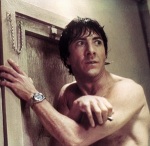 Poor Dustin Hoffman. His character gets tortured in the film’s only memorable scene, and it turns out to be completely pointless. He doesn’t know anything. He’s not involved in the story, except as the paranoid villains try to involve him in it. Remove him from the story and nothing would change. The villain would still unsuccessfully try to peddle his diamonds and get caught and sentenced to death, especially after slitting a man’s throat on the street in broad daylight.
Poor Dustin Hoffman. His character gets tortured in the film’s only memorable scene, and it turns out to be completely pointless. He doesn’t know anything. He’s not involved in the story, except as the paranoid villains try to involve him in it. Remove him from the story and nothing would change. The villain would still unsuccessfully try to peddle his diamonds and get caught and sentenced to death, especially after slitting a man’s throat on the street in broad daylight.
Even if he did get away, the greedy double-crosser Peter Janeway would probably betray him and kill him for the diamonds. Either way, the titular character of this film is completely uninvolved in the plot, and Marathon Man’s ending would not be changed much by his absence.
7. Heaven’s Gate
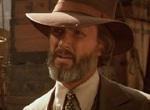 Heaven’s Gate gets a bad rap, but it really is quite an intriguing experience to watch. Sadly, main character James Averill contributes virtually nothing to the story. He makes a half-hearted attempt to stop some barons from hiring killers to drive a bunch of immigrants from their land on the American Frontier, he tries to persuade his girlfriend to leave to no effect, and he tries to defend the immigrants, who still wind up being brutalized and slaughtered by the dozens.
Heaven’s Gate gets a bad rap, but it really is quite an intriguing experience to watch. Sadly, main character James Averill contributes virtually nothing to the story. He makes a half-hearted attempt to stop some barons from hiring killers to drive a bunch of immigrants from their land on the American Frontier, he tries to persuade his girlfriend to leave to no effect, and he tries to defend the immigrants, who still wind up being brutalized and slaughtered by the dozens.
In the end, all of his friends and enemies die and he alone lives to tell the tale. The U.S. government orders the killing to stop, and there was nothing Averill did to get that last-minute rescue. He’s simply a witness to the horrors of this particular tragedy, nothing more.
8. Harry Potter and the Sorcerer’s Stone
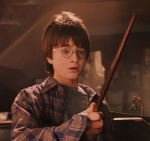 Harry Potter does a lot of growing in the first film in his series, Harry Potter and the Sorcerer’s Stone, but he accomplishes little else. Snape does most of the work, and he suspects Professor Quirrell almost the entire time, with no help from Harry. In the big finale, Harry and his friends go through several deathtraps to try to protect the Sorcerer’s Stone from being stolen by Voldemort, but what they don’t know is that the stone is perfectly safe. It can only be obtained by someone who wants it without wanting to use it. Voldemort could have stared into the mirror for hours until Professor Dumbledore arrived and he wouldn’t have been able to touch the stone. Harry managed to put it in more danger by showing up than if he had done nothing. Quirrell still would have been discovered by Snape and likely killed by the Dementors.
Harry Potter does a lot of growing in the first film in his series, Harry Potter and the Sorcerer’s Stone, but he accomplishes little else. Snape does most of the work, and he suspects Professor Quirrell almost the entire time, with no help from Harry. In the big finale, Harry and his friends go through several deathtraps to try to protect the Sorcerer’s Stone from being stolen by Voldemort, but what they don’t know is that the stone is perfectly safe. It can only be obtained by someone who wants it without wanting to use it. Voldemort could have stared into the mirror for hours until Professor Dumbledore arrived and he wouldn’t have been able to touch the stone. Harry managed to put it in more danger by showing up than if he had done nothing. Quirrell still would have been discovered by Snape and likely killed by the Dementors.
The only things you could argue Harry actually accomplished were to win a Quidditch game, save Hermione from a troll, and win the House Cup for Gryffindor, none of which has any effect on the larger story of stopping Quirrell.
By the way, you could almost say that Harry was completely superfluous to the story of Harry Potter and the Half-Blood Prince, too, except for the fact that Harry does convince Professor Slugworth to come to Hogwarts, and he proves valuable in explaining the nature of Horcruxes. Other than that, Harry doesn’t affect the story much.
9. Donnie Darko
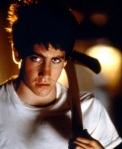 Donnie Darko is a high-school student who gets saved from a falling jet engine by a human-sized, demonic rabbit. Donnie then proceeds to have all sorts of strange things happen to him. He shoots a man wearing a rabbit costume, exposes a motivational speaker as a pervert by burning down his house, and does all sorts of other bizarre things to shake things up around his town.
Donnie Darko is a high-school student who gets saved from a falling jet engine by a human-sized, demonic rabbit. Donnie then proceeds to have all sorts of strange things happen to him. He shoots a man wearing a rabbit costume, exposes a motivational speaker as a pervert by burning down his house, and does all sorts of other bizarre things to shake things up around his town.
What is all this building toward? It turns out that Donnie actually died in his bedroom when it was hit by the jet engine, and all of this was some kind of hallucination, wormhole, or something else never fully explained. So Donnie was going to die no matter what he did with the short time given him. What is this movie about, again?
10. Chinatown
Jake Gittes is a Los Angeles private investigator who is hired by a mysterious woman to investigate a possible affair her “husband” is having. The plot only gets more complicated from there. After an unfortunate incident with his nose and a knife, a lot of investigating, and some other twists and turns, Jake learns the ugly truth… just in time to be too late to do anything about it.
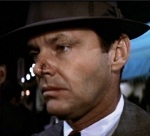 “That’s Chinatown, Jake,” is the film’s final line. It captures the sense of powerlessness of the proceedings of the film Chinatown. What was happening was too big for one man to fight, like trying to stop an oncoming river with your arm, as Jake unfortunately learned. Whether or not Jake succeeded in his investigation, the villain would have won. He had already done so much damage before the film even begins, it was impossible to stop him from the start. The point of the film is coming to grips with that fact.
“That’s Chinatown, Jake,” is the film’s final line. It captures the sense of powerlessness of the proceedings of the film Chinatown. What was happening was too big for one man to fight, like trying to stop an oncoming river with your arm, as Jake unfortunately learned. Whether or not Jake succeeded in his investigation, the villain would have won. He had already done so much damage before the film even begins, it was impossible to stop him from the start. The point of the film is coming to grips with that fact.
In Good Company
Raiders of the Lost Ark is in good and bad company with this collection of films. Each of them has a protagonist who failed to accomplish anything in terms of changing the direction of the conclusion of the story. That’s not to say these are all terrible films. Many of them are undisputed classics. But now you have a more complete perspective on each of them.
What are some others you would add to this list? Dr. Strangelove (Or How I Learned to Stop Worrying and Love the Bomb)? Fantastic Four: Rise of the Silver Surfer? I’d love to hear your ideas in a comment below.
This is the Deja Reviewer bidding you farewell until we meet again.
All images are the copyright of their respective owners.
Want to Support the Deja Reviewer?
If you’d like to support the Deja Reviewer, please consider donating a few dollars to keep this site going strong. I’ll even send you an original joke if you do! Try it, and prepare to enjoy a good chuckle.
$5.00

Good catch with Terminator 3. There are many other plot holes in that movie, but I tend to set them aside for that one scene where the terminatrix takes a flying leap on to a hearse. That is so classic. And the music by Beltrami rocks as well!
LikeLike
Thank you. That movie definitely has some show-stopping action sequences, I can’t argue with that. It’s true that solid action can forgive, or at least distract from, plot holes for a while. 🙂
LikeLike
Toht follows Indy to Nepal, without Indy the Nazi’s can’t find the bar, or the headpiece or the ark.
LikeLike
That definitely sped up their search. But given enough time and resources the Nazis would have found the Well of Souls eventually. They already knew where the city was. They wouldn’t have stopped digging until they found what they were looking for.
Plus, they already knew about Abner Ravenwood, so I’m sure they would have tracked down his daughter Marian eventually.
LikeLike
What a fatalistic, yet funny, approach to movies! No matter, my love for Indiana Jones continues unabated.
In some of these cases, most specifically To Kill A Mockingbird, I wonder if storyline impact is actually that clear cut. All those events you mention happen regardless of Atticus, but arguably the most important plot outcome of the book is that Morality, acting through Finch, takes a passionate stand against racism. You could argue this is thematic instead, but it takes center position in the plot and even the tragic outcome only serves to underscore the importance of the defense. Without Atticus, the story becomes one that’s been played out hundreds of times – with him it transforms into a story of virtue, where immorality’s victories are temporary aberrations at bet.
Great and witty post!
LikeLike
I’m glad to hear that minor story problem doesn’t affect your love of Indiana Jones. Raiders of the Lost Ark is still one of my favorite movies, too.
That’s a good point about Atticus Finch. He’s definitely a great symbol of justice and morality, but he fails to change anyone’s mind. Everyone is so set in their ways that he can’t sway them. From a purely story perspective he doesn’t affect anything, but that doesn’t mean he’s not a great character. He certainly has an effect on his daughter, but Indy had a big effect on Marion and other characters without changing the overall story of his film.
I’ll try to be a little less fatalistic in my next article. 🙂
Thank you for your comment.
LikeLike
#4 ‘Star Trek: The Final Frontier’
Kirk is the only one who’s resistant to Sybok’s influence, refusing to let go of his own pain because he understands that those incidences which led to it are part of a collective that make us who we are, and in doing so, clarifies and thereby affirms for both Spock and McCoy that their place is actually with him, not Sybok.
It’s an important, crucial scene of that otherwise terribly flawed film.
LikeLike
Good point. So Kirk did contribute something to the film, however insignificant. I don’t know if I could ever bring myself to watch that movie again to find anything else he might have done.
LikeLike
You messed up on Donnie Darko. If Donnie hadn’t sent the engine back through the time vortex then the tangent universe would have possibly destroyed the regular universe. He psychicly sent the engine back through the time vortex that he created. The movie doesn’t really explain it.
LikeLike
Thanks for pointing that out. So that’s what the bunny means when he tells Donnie that the world is going to end in a few days at the start. The world really WAS going to end. I thought it was just sort of a figurative thing that time is going to loop around at that point. So Donnie saves the time-space continuum. That’s definitely something I failed to divine from that crazy ending.
LikeLike
I guess if you ignore the obvious plot points you could conclude Indy was irrelevant. But not everyone is so easily confused with such a generic outline of the movie. It was for giggles on a TV show who’s target is people who don’t really think that deep… not a thought out philosophical question.
Without Indy. Marion dies from Nazi torture. Nazi’s get the ark easy. Open it. Die. Other Nazi’s find ark upon investigating missing personnel and new found treasure. Eventually Nazi’s figure out how to drop the ark amongst their enemy and take the top off. Nazi’s rule the world.
With Indy, Marion lives. The ark is resting safely in a warehouse not killing anyone by losing it’s top.
It’s really not that complicated. Indy was relevant if for no other reason than to know to close his eyes and survive… thereby being a survivor and keeps it away from the Nazi’s and warns others not to take the top off the ark.
LikeLike
Thank you for your concern. You can definitely find plenty of things to nitpick about that show’s claim that Indiana Jones has no effect on the ending of Raiders of the Lost Ark.
Of course some major elements of the story would have changed, like Marion’s fate and Sallah’s involvement in the digging if you removed Indy from the story. The point is that he just delayed the inevitable and he was mostly just along for the ride. It’s still an amazing movie. No worries.
LikeLike
Indy’s involvement in the storyline is similar to the excellent observation you made about Harry Potter in the Sorcerer’s Stone. If he hadn’t traveled to Egypt and enlisted Sallah’s help to find the ark’s resting place there’s no guarantee that Belloq and the Nazi goons would have found the ark’s chamber. It’s entirely possible that no Indy = no ark.
In any case, it’s funny to at least recognize just how little impact he had in keeping the ark out of the wrong hands. Especially when he just handed it over to the U.S. freaking government! Patriotism aside, why would you think to trust anyone, especially a military complex, with such a destructive force? Why didn’t he take the ark to his previous museum? Or better yet, drop it into the middle of the Atlantic Ocean?
That reminds me…the biggest question that I have about Raiders isn’t whether or not Indy had any effect upon the outcome of the story. My question is, how in the world did he get the ark off of that island in the Mediterranean and back to Washington D.C.? Seriously!
LikeLike
Smart people use adverbs.
LikeLike
Truly. 🙂
LikeLike
The ark’s underlying principles are a mystery throughout the film. If it is in fact “the” ark, with miraculous power derived from the God of Judaism and/or the Universe, then it’s reasonable to assume that it kills the Nazis because they’re enemies of goodness and of Jews in particular, not because they had their eyes open (and Indy and Marion only keep theirs closed because he anticipates something graphic).
Then again, the Bible itself gives accounts of at least one Jew being killed by the ark for touching it, so perhaps it is canon (literally speaking) that the ark is actually an indiscriminate keep-away-from-me-or-I’ll-melt-your-face sort of sacred artifact, not an enforcer of human-oriented justice. In the latter case, then there is indeed a risk of Nazis using it toward their own ends, but that’s ambiguous.
LikeLike
Some good points, but I have never really considered any lack of impact by Indy on the ultimate outcome to be a plot hole, anyway. Raiders is the ultimate adventure film, and I have always considered the best, most important thing about adventures, fictional and real, is not what you do, but what happens to you. Indy and the Nazis were along for the ride, the Ark was always the one in control. Almost like the One Ring.
LikeLike
I agree. It’s funny to shock the system a little bit and think of movies in ways that I’m sure their creators might not have considered when they were making them. Raiders of the Lost Ark is one of my favorites, and I like your comparison to Lord of the Rings. The Ring liked to think it was in control the whole time, motivating people to hold onto it at all costs, but it backfired when Gollum couldn’t resist taking it back from Frodo in Mount Doom.
LikeLike
Pingback: 11 Movies That Actually Live Up to Their Hype | Deja Reviewer
All the President’s Men – if you watch it Woodward and Bernstein don’t uncover much, they just try to find out what the FBI found out, it then goes to a grand jury with no help from then
LikeLike
Dr. Strangelove is an interesting suggestion, but I don’t think it counts because it’s a morbid satire whose whole point is that even with all these people (the ones who know what is about to happen and why) doing what they can (albeit some, like General Turgidson, half-heartedly), nuclear armageddon is too difficult to prevent once it’s begun. Of course, in a larger sense, almost any tragedy (or tragicomedy) might go on a list like this, because by definition the main characters either have no effect on the outcome or make it worse.
LikeLike
You’re probably right. I was sort of throwing out suggestions at the end, but I hadn’t fully thought them through. That was just my way of getting some more creative juices flowing.
LikeLike
Very interesting article, I have just seen this Big Bang Theory episode (a bit late I guess) and the first think was to check what other people say about this clever observation that was made about the Indianna Jones film. Eventually it appeasrs it’s truth about Indy and it’s same for the other films you mention here. I have one only objection and that is about Atticus. This book/movie is relatively deeper than the average movie and there are things there which are more difficult to see. Firstly, Atticus is not the main character in the story. Especially in the book we see everything through the eyes of his daughter who actually is the main character and she is deeply influenced by her father and his actions during the story. In addition, Since the beginning of the trial when the innocent accused black person gives a ‘wrong’ answer saying that he was just trying to help because he felt pitty for the girl, everybody including Atticus seem to know that there is not way to be acquited no matter what happens next, but Atticus continues to provide valid arguments and ultimately proves that this man is innocent because he wants to show to everybody that they will convict this man despite knowing that he is innocent. It is a message to us and at the same time to the characters if the story that prejudice defies logic. Given all these Atticus fails to achieve what seems impossible at the time, to save that man, but makes everybody responsible for their actions by stripping away every possible excuse thay might have as a society or individually for what they are doing. In that sense he plays a crucial role in the story.
LikeLike
You say that in “Harry Potter and the Half-Blood Prince” that Harry doesn’t effect the story much. Perhaps you should actually read the book instead of watching the movie. If it weren’t for Harry winning the vial of Felix Felicis and then sharing it with Ginny, she most likely would’ve died in the Battle of the Astronomy Tower ….. which wasn’t in the movie.
LikeLike
Thank you for pointing that out. I never actually saw the movie; I just read the book. I must have forgotten that detail. But even so, Ginny’s death wouldn’t have affected the outcome of the story.
LikeLike
With regards to “Raiders of the Lost Ark” and Indiana Jones having no effect on the outcome of the story, I disagree that this is a story “problem.” I believe it is the point. This is irony. After all the cliffhangers and stunts, after Indiana chasing Nazi’s and being chased by them, after all is said and done, the Ark of the Covenant winds up in exactly the same condition as it was at the beginning of the movie: locked up in a government storage facility away from public view, no doubt awaiting another swashbuckling archaeologist to come in another 3,000 years. Plus, calling this a “story problem” misses another important story point, the MOST important story point: Indy gets the girl! Indiana Jones and Marion Ravenwood reconnect and go on with their lives together. That no one seems to get this means that many people are focusing on the action scenes and ignoring the story. Remember Gene Roddenberry’s dictum, “Stories are about people.” Not exploding faces, submarines, desert car chases, and machine guns. People.
LikeLike
Very true. The Ark is used as a MacGuffin to drive the plot forward, but it’s the characters who do all the changing. Thank you for pointing that out. 🙂
And you’re absolutely right that it’s supposed to be ironic that the Ark gets lost by the government. The more things change, the more they stay the same, even thousands of years later.
LikeLike
Thanks! I remember watching “Raiders” in the theater in 1981, and when the guy in overalls is wheeling the Ark to some spot in a gargantuan warehouse, people just laughed out loud. Unlike Amy Farrah Fowler, we all got it.
LikeLike
Pingback: Movie Matchups: Who Framed Roger Rabbit vs. Chinatown | Deja Reviewer
In the half blood prince Harry wills Dumbledore on to drinking the liquid in the bowl the “horcrux” is in. Without Harry Dumbledore never would have abotained the fake locket. Without the fake locket Harry Hermione and Ron could not have found the real locket in the next book.
LikeLike
Good call. It’s been a while since I read that book, so I can’t remember if there was a reason why it had to be Harry. Dumbledore might have been able to find someone else to help him, too.
Anyway, it looks like I was probably too hasty in suggesting that one, as well. Thanks for pointing that out.
LikeLike
True but regardless it was Harry. Dumbledore trusts harry. Harry respects dumbles. Another character might have had the strength to force harrys role model to drink a glass of mind shattering poison- it might have even been easier in that case, but if it wasn’t harry he wouldn’t have experienced this and consequently grown as a character and also harry would still need to retrieve the locket from that character.
Also seem to recall things that dumbles says when the poison affects his mind are clues for later on. Cant guarantee that though. Another thing i recall is that i think dumble had been there before. On his return he bRought harry because he could trust harry as a sidekick. Also needs the fact checkers for that
LikeLike
Yeah, I read Harry Potter and the Half-Blood Prince years ago, and I can’t remember all of the details, either. I just threw that in as a little aside without thinking it through completely, so it’s most likely Harry does play at least some role of importance in the story that I didn’t ascribe to him. Thank you for pointing that out.
LikeLike
Without Atticus defending Tom, Bob would have never disliked him from the trial, which would mean that he would not try to kill Atticus’ children, which would mean that Bob would have never been killed by Boo Radley. This shows that Atticus does play a role in the story.
LikeLike
Sure, a minor character wouldn’t get killed, but the main story would not be affected at all by the absence of Atticus. Just like how there are obviously aspects of Raiders of the Lost Ark that would change without Indiana Jones, but the overall conclusion would be the same.
LikeLike
Indi is pretty pointless in raiders in terms of stopping the ark but those are all events that happen to him and affect his character arc which is the main crux. Sure we could have watched a movie where the nazis discover the ark themselves and die in the same way.. But then we would never see the specific tale of indi and whatbhe experienced. To say he doesnt affect the story is an impossible statement. Indi IS the story and we are seeing those ordeals he was out through as a protagonist
LikeLike
Also as a follow up to that – the movie isnt called the lost arc. Its the story of ‘Indiana Jones and the Raiders of the Lost Arc’.
I think this idea that the story is mostly about what the characters experience and not wether they are successful or not is what could explain some of these stories being so revered.
LikeLike
The name “Raiders of the Lost Ark” was changed years later to include the words “Indiana Jones and the” at the start of it to match the other films in the series, much like the original “Star Wars” was given the subtitle “Episode IV: A New Hope” after it became successful enough to warrant sequels and prequels.
But originally, “Raiders of the Lost Ark” was the title. And it still is, in my book.
LikeLike
I agree, it’s characters that matter most. It’s just funny to think that the main MacGuffin of the story, the Ark of the Covenant, would have most likely ended up in the same position regardless of what the characters did or how they changed over the course of the story.
LikeLike
Yeah I reckon so as well. Something that would probably cause the script to be rejected these days if it was made by anyone else!
LikeLike
I know this has nothing to do with anything but i just had this thought that could be a potential de ja reviewer article. I just rewatched Lost pilot and Stargate universe pilot and noticed they have some crazy weird similarities and the show overall does too.
I.e both groups are lost. The environment presents weird mysteris and dilemas of ‘destiny vs free choice’. The ‘properties’ of the island / ship is sought after by othetd trying to join them. Rush = John Locke.
Young = Shepard
Eli = hurley
Greer = Sawyer
And many mire
Flashbacks and flash sideways throughout the shows.
Theres even a stolen/lost baby dilema
LikeLike
You missed one of the greatest but most ineffective heroes of all time: Bond, James Bond, 007. Goldfinger, perhaps the most beloved film of the series, Bond has almost nothing to do with the outcome of the story – he gets taken prisoner, locked in a gold vault with an atomic bomb and a belligerent Korean, and the army had to open the vault, and the US nuclear expert had to disarm the bomb. It is only vaguely implied that Bond is so good in bed he MIGHT have influenced a lesbian to replace poison gas with knockout gas.
LikeLike
Yeah, that’s a really funny example because Goldfinger is often cited as one of the high points of the series, but it’s really the one where James Bond has the least impact on the story. I’d say his role in persuading Pussy Galore to switch out the poison gas was crucial to the heroes’ victory, but other than that, he’s pretty unimportant.
LikeLike
Another point about Harry Potter. Each of the seven stories is really just an installment of the larger story. And of course, Harry is absolutely critical to that, as he is “the chosen one” whose destiny is to defeat Voldemort.
Who is Professor Slugworth? Did you mean Slughorn?
If you have read the books only once, re-read them and notice how many time Rowling inserts tiny clues about significant things in later books.
LikeLike
Maybe Atticus was never meant to be the protagonest. I read the book before I saw Pecks amazing Atticus,I thought Scout was the protagonst.Based on Watchman she was ….Atticus really is more passive.
LikeLike
That’s a very interesting idea. I think you’re right that he was never meant to be the main hero, which makes it even more ironic that the AFI named Atticus the #1 heroic character of all time when he’s passive, ineffective, and not really the focus of the story.
LikeLike
The question of whether Indy affected the story bugs me, because it shows how many people are unable to understand what a movie is really about. Raiders is Indy’s story; to say he doesn’t affect the story is asinine because without him, there is no story.
Raiders is not the story of finding the Ark of the Covenant, it’s the story of a man who transcends his own nature. Have you ever wondered why we get that scene in Cairo where Belloq taunts Indy about how they’re exactly alike? It’s because this is the central theme of the film! Belloq is right — he and Indy are basically the same person. In the climax of the film, Indy proves Belloq wrong by doing something that Belloq cannot — he looks away. Thus, the man who can rise above his nature defeats the man who cannot. And THAT is the story of Raiders.
LikeLike
Natalie Portman’a character in V For Vendetta.
She’s nothing but a witness.
LikeLike
It’s fascinating because in the graphic novel Evey is an essential character who plays a big role at the end in making sure V’s legacy continues after his death. She was much more than just a passive witness like she is in the film.
I’ll probably have to do a Movies That Get Worse on Multiple Viewings about V for Vendetta because it keeps getting a little worse the more I think about it.
LikeLike
Pingback: Welcome and Merry Christmas | Deja Reviewer
Pingback: 10 Villains Who Were Defeated by Simply Ignoring Them | Deja Reviewer